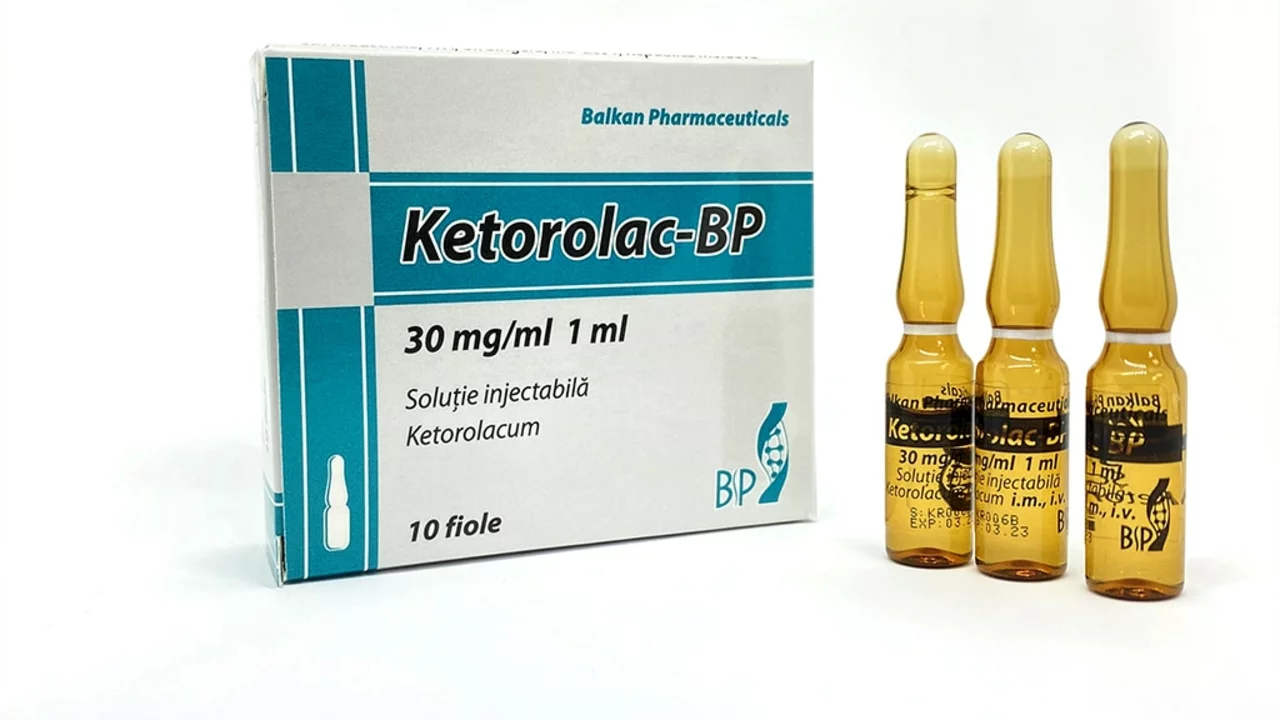Ketorolac Tromethamine: What It Is and How It Helps
If you’ve ever needed fast‑acting pain relief after surgery or a bad injury, you might have heard of ketorolac tromethamine. It’s a strong non‑steroidal anti‑inflammatory drug (NSAID) that works like a hammer on inflammation and pain, but only for short periods. Doctors usually prescribe it when over‑the‑counter meds just aren’t enough.
How Ketorolac Works
Ketorolac blocks the enzymes COX‑1 and COX‑2, which produce prostaglandins—chemicals that cause swelling, fever, and pain. By cutting down prostaglandin production, you feel less ache and notice reduced swelling at the injury site. The drug is available as an oral tablet, injectable solution, or eye drops, each designed for different types of pain.
Dosage & Safety Tips
Typical adult dosing starts with a 10‑15 mg injection right after surgery, followed by 10 mg tablets every 4–6 hours. You never want to go over 40 mg in a day and should stop using it after five days total—longer use raises the risk of stomach bleeding and kidney problems.
Here’s a quick checklist before you take ketorolac:
- Are you over 65 or have kidney disease? Talk to your doctor first.
- Do you have a history of ulcers, heart failure, or asthma? Ketorolac can make those worse.
- Are you on blood thinners like warfarin? Combining them boosts bleeding risk.
If any of these apply, your doctor might suggest an alternative painkiller.
Common Side Effects (and What to Do)
The most frequent complaints are stomach upset, nausea, and a headache. If you notice black or bloody stools, vomiting blood, or sudden kidney pain, stop the drug immediately and seek medical help—these can signal serious complications.
When Not to Use Ketorolac
Avoid ketorolac if you’re pregnant, especially in the third trimester, because it can affect the baby’s heart. Also skip it if you’ve had a recent heart attack or stroke; NSAIDs can strain the cardiovascular system.
Key Takeaways
Ketorolac tromethamine is a powerful option for short‑term pain relief when other meds fall short. Stick to the prescribed dose, watch your health conditions, and stop using it after five days to keep side effects low. When in doubt, always check with a pharmacist or doctor—they can guide you toward the safest choice for your situation.

Ketorolac Tromethamine and Alcohol: What You Need to Know
- Jul, 12 2023
- 6
In my latest blog post, I delve into the critical topic of combining ketorolac tromethamine, a potent painkiller, with alcohol. I discuss the potential dangerous effects, such as increased risk of stomach or intestinal bleeding. I also highlight why it's essential to avoid alcohol while on this medication, including the potential for dizziness and impaired judgment. Furthermore, I stress on the importance of discussing your alcohol consumption with your doctor when prescribed this medication. Ultimately, the key takeaway is that combining ketorolac tromethamine and alcohol is a risky mix that should be avoided for your safety.
Categories
- Health and Medicine (65)
- Health and Wellness (57)
- Medicine (37)
- Women's Health (11)
- Mental Health (10)
- Men's Health (7)
- Beauty and Wellness (4)
- Health Information (4)
Archives
- March 2026 (1)
- February 2026 (11)
- January 2026 (25)
- December 2025 (28)
- November 2025 (25)
- October 2025 (27)
- September 2025 (14)
- August 2025 (3)
- July 2025 (2)
- June 2025 (2)
- May 2025 (3)
- April 2025 (4)
- online pharmacy
- medication safety
- dietary supplement
- health benefits
- dietary supplements
- generic drugs
- prevention
- fertility
- online pharmacy Australia
- side effects
- QT prolongation
- medication side effects
- diabetes medications
- GLP-1 agonists
- nocebo effect
- brand vs generic
- treatment
- treatment options
- benefits
- connection
